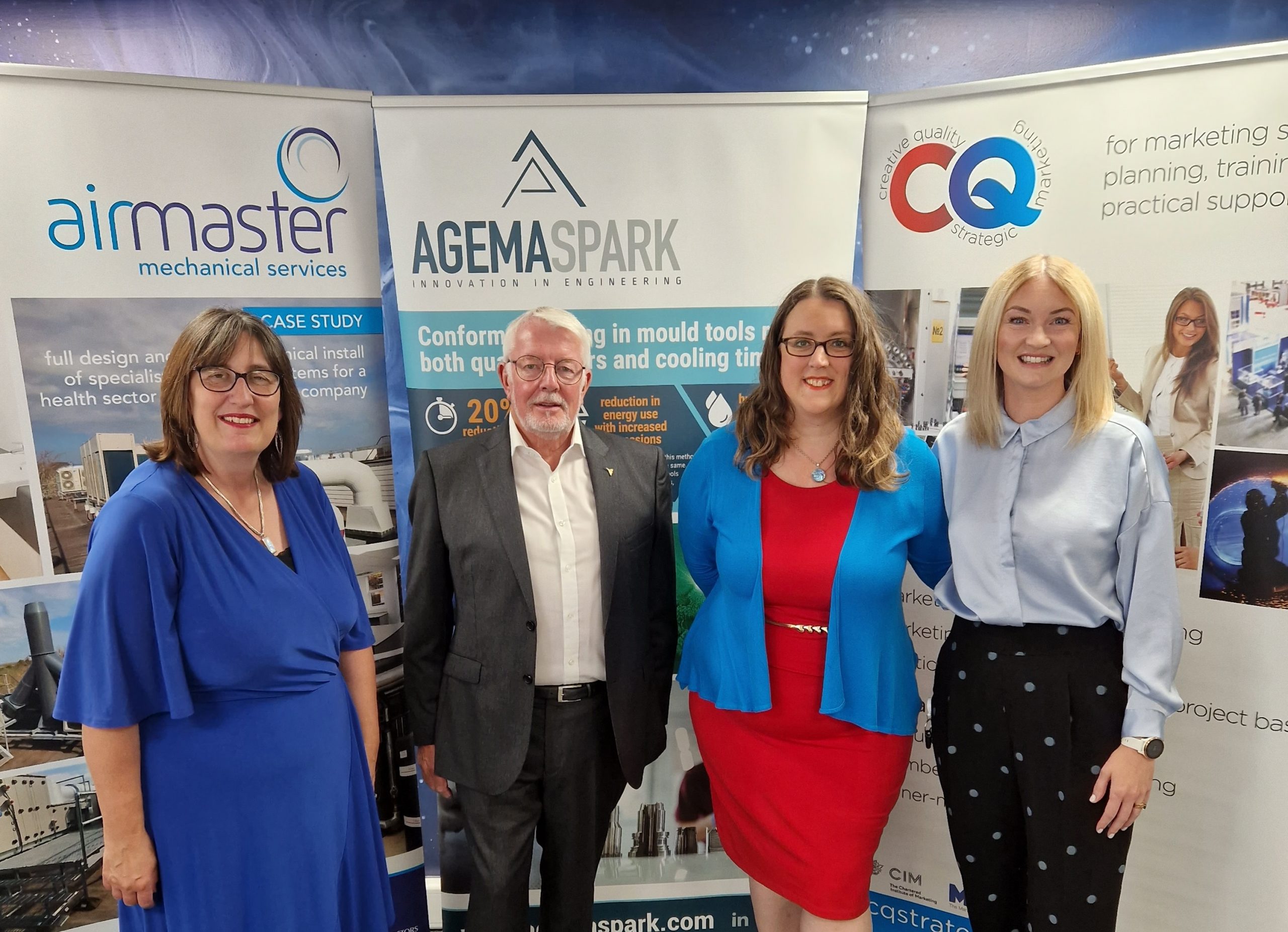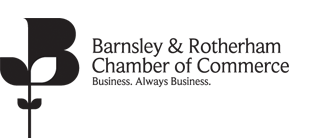
South Yorkshire based businesses CQ Strategic Marketing, Agemaspark and Airmaster celebrate 10, 20 and 30 years in business
South Yorkshire based businesses CQ Strategic Marketing, Agemaspark and Airmaster are all celebrating milestone anniversaries this year at 10 years, 20 years and 30 years respectively. They took part in a roundtable to discuss how doing business has changed during that time.
The panel was Chaired by Caroline Broad of Clarion Solicitors.
Jackie Cook, managing director at CQ Strategic Marketing specialises in marketing services for manufacturing SMEs without their own in-house marketing team. Since starting out as a sole trader in 2012, Jackie has witnessed many changes in the industry and more recently created the Equality in STEM network to encourage greater diversity in the industry.
WHAT ATTRACTED YOU TO THE SECTOR/INDUSTRY?
Manufacturing has always been at the heart of my profession, even back to the days where I worked as a secretary. After a few years, I had the opportunity to join the marketing department and the company supported me through gaining marketing qualifications before later joining an international engineering company. From this, I noticed that many engineering SMEs didn’t have access to an in-house marketing team, so the idea for CQ Strategic Marketing was born and now we work with businesses across South Yorkshire, and Europe!, to essentially become their marketing team. I love the diversity of what we do, every day is different.
WHAT IS IT THAT HAS KEPT YOU IN THE INDUSTRY?
We work with a very diverse mix of clients, and I love finding out more about what they do and how things are made – especially when we get to visit the factories and become immersed in the processes. My clients are based internationally, so advances in technology facilitate those relationships.
When I first started out in marketing, we were sat stuffing piles of paper into envelopes and doing everything manually, whereas everything now is done digitally. It’s been a very welcome change, as clients are keen to know how their marketing is working and more specifically, which parts are most successful. We can provide so much data to the clients now – details of traffic on their websites, open rates of emails which helps us to be far more strategic than 20 years ago.
HOW DO YOU GROW THE BUSINESS, FACE CHALLENGES AND CONTINUE TO PROMOTE THE SECTOR?
We are working with clients on promoting their apprenticeships and training programmes as we know there is a skills shortage, so we need to work on enticing people into the industry and helping them to grow within it. Social media is also key in this day and age to promote the business and the sector – gone are the days of the mailer where you never knew if anyone actually read it or if it went in the bin! Working with trade associations is another way we can promote the sector as a whole, as well as our own business.
FUTURE-PROOFING THE BUSINESS
I’ve set up a network called Equality in STEM. We’ve started running columns in unLTD magazine (strategically chosen as it goes out to a range of businesses in South Yorkshire, not just engineering companies) showcasing female role models in the industry. In the industry, we recognise issues with diversity and skills shortages, but we must get the word out to parents, teachers and others out in the community in the hope of moving practices forward in the future. There’s lots of different options for career paths, and we need a shift in perception that engineering doesn’t have to be a man’s profession. We need to remove any barriers and restrictions to the industry for it to be for all.
WHAT DOES THE FUTURE OF THE SECTOR HOLD?
I think technology will continue to change as much as, if not more, than it has in my last 20 years in the industry. The ways we communicate will be changing, and we’re moving to an era where we need to market to all of the stakeholders, so the marketing emphasis is shifted to include the supply chain from an environmental perspective and the attraction of future skills as well as feeding the business development/sales funnel.
www.cqstrategicmarketing.com
www.equalityinstem.org.uk
Paul Stockhill managing director at Agemaspark, a precision engineering company responsible for catering for all types of manufacturing. With products featuring as far as the International Space Station down to rice crispies, Paul discusses the importance of a skilled workforce.
WHAT ATTRACTED YOU TO THE SECTOR/INDUSTRY?
I have been lucky to have spent my 50 years across many different businesses in various roles, starting all the way back in school with metalwork and woodwork – back then the health and safety wasn’t quite what it is now, so we were allowed to get stuck into the machines and things like that. I started as an apprentice toolmaker at Crompton Parkinson’s and worked my way up before leaving and becoming self-employed. 20 years ago, Agemaspark was born, and we have manufactured products for the international space station, put parts on Mars, and we even export to China.
WHAT IS IT THAT HAS KEPT YOU IN THE INDUSTRY?
The technology in my industry has gone from people using their hands and making patterns to computers, with everything being constantly updated. Technology has allowed us to be extremely productive in the way we work, especially at Agemaspark we rely on such technology for one-off problem solving across different sectors – our award-winning conformal cooling process is a great example of this for improving cycle times and production. Recently we also introduced 3D metal printing which has revolutionised our processes. I hope to continue to see the same level, if not more, innovation over the next 20 years as I have at Agemaspark.
HOW DO YOU GROW THE BUSINESS, FACE CHALLENGES AND CONTINUE TO PROMOTE THE SECTOR?
Communication between all sectors is paramount for us, the local government have been very active in supporting local businesses – we had essentially no break between Brexit and the pandemic, so we were hit with two major events for manufacturing within the same time frame. Supply chains have been very difficult to manage, so we have had to rely on getting out there and finding out where else we can source and find the right solutions.
FUTURE-PROOFING THE BUSINESS
We’ve had an apprentice scheme in the business for the last 20 years as we saw there was a huge skills gap in engineering particularly. The majority of our staff are under 30 years old and then we have others that are over 60, with nothing really in the middle, so we are facing a problem in a few years once the older generation in our team begin to retire. The apprenticeships, combined with new technology allow us to bridge that gap, with the older generation sharing their knowledge. From a business perspective, with the apprenticeship scheme, we have virtually no staff turnover, they’re all of a similar age so they have a lot of similar interests. For us, it’s never the same thing every day – you could be working an aircraft engine or products for rice crispies – so the diversity helps our apprentices to learn far more than they perhaps would elsewhere.
WHAT DOES THE FUTURE OF THE SECTOR HOLD?
I think we’re at a stage now where people are looking at ways to create a sustainable future for all our young people. You must look at the bigger picture, it’s not just solar and wind power, it’s all of the small changes that make a big difference. For example, if we can take 20% out of a cycle time for one product, multiplied by the millions of products that are produced daily, that has a huge impact. We must look at these gains which will help us to control the future of the planet.
Lisa Pogson, managing director at Airmaster joined the mechanical services design and build business over 25 years ago that delivers energy efficient heating, cooling, ventilation, maintenance and small works nationally across a diverse range of sectors. Lisa has witnessed many changes in the sector, including the commitment to sustainability and the increasing importance in practice.
WHAT ATTRACTED YOU TO THE SECTOR/INDUSTRY?
My brother-in-law, Richard, started the business 30 years ago after deciding he wanted to go self-employed. At the time, I was helping him out as I had some experience in the sector, so I was assisting with bookkeeping and
other tasks. After much persuasion, I joined the business part-time around 25 years ago and I am now the proud managing director, supported by our operations director and a great team around me.
WHAT IS IT THAT HAS KEPT YOU IN THE INDUSTRY?
I’ve always had a core interest in the property and building sector, especially with many of my family members working in trades. I love the commitment to innovation in the sector – during the COVID-19 pandemic, we worked on decentralising ventilation systems and our team did a significant amount of work in laboratories, aiming to eliminate COVID using technology within the ventilation systems.
HOW DO YOU GROW THE BUSINESS, FACE CHALLENGES AND CONTINUE TO PROMOTE THE SECTOR?
For me and for our staff, networking is key. Our team all have their own networks, whether this is within customers or with subcontractors and other links to the supply chains. This really helps us to stay ahead of the game, staying ahead of all the decisions that you have to make on a daily basis – the more information you can get using all of your contacts, the better.
FUTURE-PROOFING THE BUSINESS
On 1 July 2021, we became an employee-owned trust. As a business, we’ve always had quite a family feel and our view was that the team around us had helped to grow the business to what it was, so it seemed appropriate to look into how we could input incentives for this. Not only this, it allowed our most senior managers to exit the business, so everyone benefitted from this. There are always things you would do differently in hindsight, but generally it’s been an extremely positive experience and we really do have such a great team and it’s helped us to grow.
WHAT DOES THE FUTURE OF THE SECTOR HOLD?
It’s so interesting hearing Paul talking about Mars and space, as that is something I’d absolutely love to do. I think for us, 20 years ago I did my master’s degree in management and there was talk of sustainability already
back then. In construction now, if you’re not looking at sustainability and how to be sustainable, you may as well forget it. Even to the point where we’re fitting an office, we look at the quality of the ventilation for the staff, how many plants there are and how close the access is to water so they can work properly, and all of that is the future for us. Saving money where we can is on everyone’s agenda at the moment too, and we’re
always thinking of the net zero target.
https://cqstrategicmarketing.com/news/unltd-business-feature-celebrating-10-years-in-business/
https://agemaspark.com/news/article/unltd-business-feature-celebrating-20-years-in-business/


Sorry, the comment form is closed at this time.